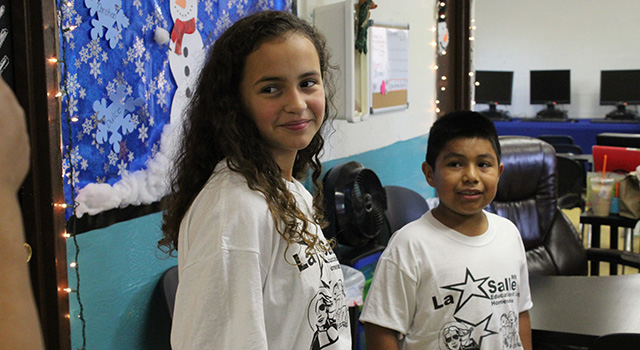By Cristina Cabrera Jarro -
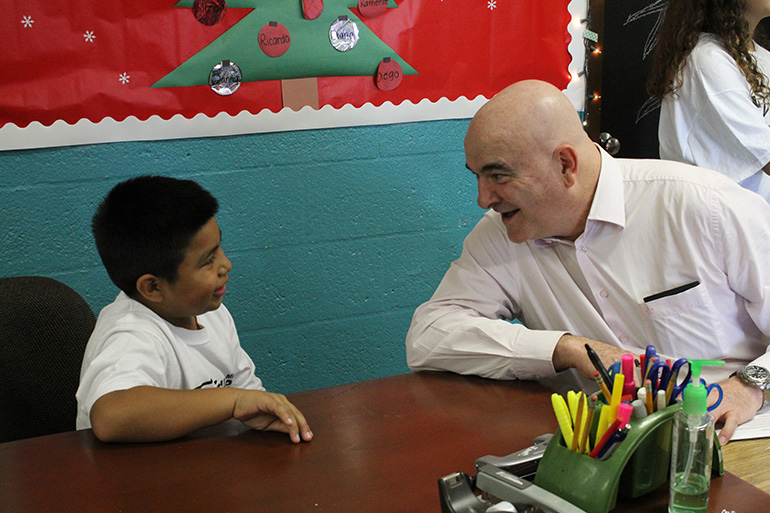
Photographer: CRISTINA CABRERA JARRO| FC
La Salle Educational Center student Danny Conde converses with visiting De La Salle Brother Paulo Petry.
HOMESTEAD | Way down south of Miami, where plants and produce grow in nurseries, and where the jets of Homestead Air Reserve Base roar as they fly by, sits the South Dade Labor Camp, owned by the Homestead Housing Authority.
The camp is home to immigrant and low-income families. It is where 13-year-old Valerie Perez’s grandparents, Araceli and Juan Carillo, have lived for over 44 years.
After Valerie’s school bus drops her and several children off at the camp, she follows a routine that has marked most of her life. She goes to her grandma’s house, says hello, and runs next door to her second favorite place, the La Salle Educational Center.
“It’s literally the house that’s right next door. I’ve been coming here since I could remember,” she said.
Valerie gets her homework done in its after-school program, with teacher assistance if needed. She gets a snack ’┐Į cookies are her favorite ’┐Į and sits at the computer to hone her typing skills. “I know where all the keys are,” she said. “I’m pretty sure I can remember most of them.”
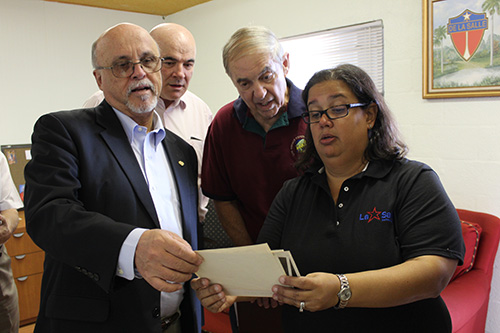
Photographer: CRISTINA CABRERA JARRO| FC
Monica Lauzurique, director of the La Salle Educational Center in Homestead, shows Brother Robert Schieler, far left, superior general of the De La Salle Christian Brothers, photos of the De La Salle schools in Cuba. Looking on are Brother Paulo Petry, center left, and De La Salle school from Cuba alumnus Hugo Castro. The superior general, some brothers and alumni visited the center in November 2018.
She’s a recurring summer camper, taking part in the center’s recreational activities, sports, field trips, and more. “There are so many things that I’ve learned here. The center means everything to me,” said Valerie, whose two siblings also attend.
In fact, her family has a history with the center. Her mom, aunts and uncles attended as children. Although Valerie and her relatives no longer live in the camp, they often visit. Her grandpa and grandma, who is known as Doña Chela, are mainstays of the center and the neighborhood.
They were among the first people visited by Monica Lauzurique after she was appointed director of the La Salle Educational Center in July 2018. “When I arrived here, I was told to not even open a door of the center before visiting Doña Chela,” said Lauzurique.
Prior to coming to work at La Salle, Lauzurique served as mission coordinator for Amor en Accion, the archdiocese’s lay missionary community whose work focuses on helping the poor in the Dominican Republic and in Miami’s sister diocese in Haiti, Port-de-Paix. Lauzurique also has a background in early childhood education. Both experiences fuse well with the charism of the De La Salle Brothers, “to provide a human and Christian education ’┐Į especially to the poor.”
The population served by the La Salle Educational Center has evolved from mostly Mexican migrants to now Nicaraguan, Honduran, Puerto Rican, and other immigrants, all still working in the farms and nurseries of Homestead.
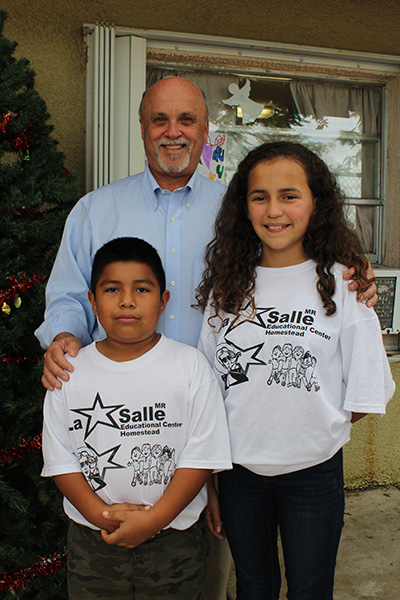
Photographer: CRISTINA CABRERA JARRO| FC
La Salle Educational Center students Valerie Perez and Danny Conde pose with Brother Robert Schieler, superior general of the De La Salle Brothers worldwide.
The center provides after school care, adult education classes, vocational classes, and the La Salle Atelier, where women learn how to sew and sell their creations to earn extra income. Recently, English and Spanish classes have been added to the adult education program, and a GED project is under discussion.
“We’re not just focused on English classes, but an overall concern for literacy in adults,” said Lauzurique. “That’s the reality of the parents in the community who live here, which plays a huge issue with children who, speaking English, have additional responsibility as the translator of language for their parents.”
DE LA SALLE ALUMNI
The center dates to 1989, when three De La Salle alumni from Cuba ’┐Į Francisco Javier Camps, Miguel Manzanero and Father Raul Perez Ros ’┐Į visited the neighboring church of St. Ann Mission. Father Jose Espino, a fellow alum, was serving as the mission’s administrator and chaplain to the migrant workers in the South Dade, Redland and Everglades labor camps nearby.
Together, they wanted to find a way for De La Salle alumni to help the migrant workers and their families; not only by providing clothing and food, but in the same way St. John Baptiste De La Salle had done over 300 years ago with boys in France. They wanted to find ways to educate in the faith and provide occupational skills to help break the cycle of poverty.
That was the start of the alumni association's commitment to the La Salle Educational Center, which operates with mostly a volunteer staff and relies on donations to support its programs.
Since her start in July, Lauzurique has spent days with volunteers cleaning, rearranging, painting and planning. They sorted through boxes of memorabilia and archives that the De La Salle alumni from Cuba had kept in storage. The boxes contained report cards, yearbooks and dozens of photos, including class photos, photos with plantation-like school buildings, and one of a school bus old enough to need a crank to get it started. Most of the memorabilia is now on display, hanging on the walls, or in albums.
On Nov. 30, Brother Robert Schieler, superior general of the De La Salle Brothers worldwide, came to visit, along with a group of De La Salle alumni. They were amazed to see so much history, and several laughed when they found themselves in class photos.
Rodolfo Díaz is the current president of the Miami-based De La Salle alumni and, as he jokes, the “youngest of the bunch,” whose average age is 84.
“We need to keep those things so that there is a legacy, so that when we are no longer here our sons, families, and individuals connected to the La Salle family know what it is that we did and why,” Díaz said.
INTERNATIONAL BOND
The alumni from Cuba are considering changing their association’s name from De La Salle of Cuba to De La Salle Alumni, Inc. They want to extend an invitation to Lasallians from other countries, such as Mexico, Nicaragua, Venezuela and beyond.
“We are trying to involve Lasallians from other countries who are much younger than us so that this continues forward. When I find someone that studied in any La Salle (school), instantaneously they are my Lasallian brothers. There is a bond,” said Díaz.
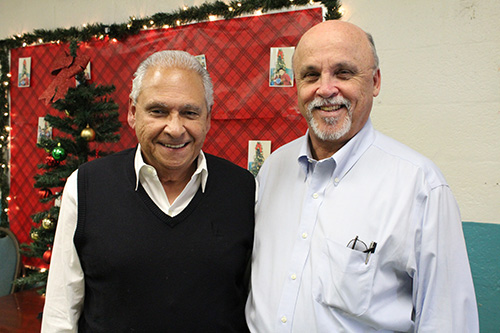
Photographer: CRISTINA CABRERA JARRO| FC
Rodolfo Diaz, left, president of the Alumni Association of the De La Salle schools from Cuba, poses with Brother Robert Schieler, superior general of the De La Salle Brothers worldwide.
Salvador Romo, an alumnus from a Lasallian school in Mexico, is a member of the alumni group in South Florida. Years ago, when his family moved to Miami, they were looking to give back to the religious community that gave him so much. He discovered the La Salle Educational Center online, and using his knowledge and experience as a dispatching manager for Hewlett Packard in Latin America, he volunteered as a computer teacher and IT tech.
“Computer here means teaching people how to get into a browser, and how to open up a Facebook account, the basic things. But sometimes they need help applying for work online. There are people that don’t know how to do that. There are people that struggle with the hand-eye coordination needed to move a mouse,” said Romo.
He believes the La Salle Educational Center offers necessary opportunities for the immigrant community, for the marginalized, and for the poor.
“It is always a good thing to offer a sense of community to any human being, regardless of circumstances, and better yet if that community offers hope,” said Romo.
FIND OUT MORE
- The La Salle Educational Center needs a central air conditioning unit. To find out how you can help, go to www.celasalleh.org.
- The De La Salle Alumni Association is seeking alumni from Cuba and all over the world. Visit www.delasallealumni.org.
CORRECTIONS: Brother Robert Schieler is superior general of the De La Salle Brothers worldwide, not just in North America, and as such the 27th successor of St. John Baptist de La Salle. The reference by Rodolfo Díaz to "my Salesian brothers" has been reworded to correct a translating error. It should have read as it does now, "my Lasallian brothers," that is, graduates of De La Salle schools. Díaz is not 84. He was referencing the average age of the Cuban alumni now in Miami. The change in name from De La Salle of Cuba to De La Salle Alumni, Inc., is being considered but not yet done.
